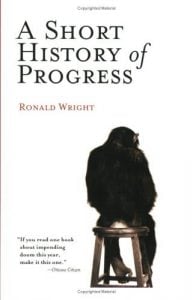A Short History of Progress
Ronald Wright (2005)
 Each time history repeats itself, the cost goes up. The twentieth century—a time of unprecedented progress—has produced a tremendous strain on the very elements that comprise life itself: This raises the key question of the twenty-first century: How much longer can this go on? With wit and erudition, Ronald Wright lays out a-convincing case that history has always provided an answer, whether we care to notice or not. From Neanderthal man to the Sumerians to the Roman Empire, A Short History of Progress dissects the cyclical nature of humanity’s development and demise, the 10,000-year old experiment that we’ve unleashed but have yet to control. It is Wright’s contention that only by understanding and ultimately breaking from the patterns of progress and disaster that humanity has repeated around the world since the Stone Age can we avoid the onset of a new Dark Age. Wright illustrates how various cultures throughout history have literally manufactured their own end by producing an overabundance of innovation and stripping bare the very elements that allowed them to initially advance. Wright’s book is brilliant; a fascinating rumination on the hubris at the heart of human development and the pitfalls we still may have time to avoid.
Each time history repeats itself, the cost goes up. The twentieth century—a time of unprecedented progress—has produced a tremendous strain on the very elements that comprise life itself: This raises the key question of the twenty-first century: How much longer can this go on? With wit and erudition, Ronald Wright lays out a-convincing case that history has always provided an answer, whether we care to notice or not. From Neanderthal man to the Sumerians to the Roman Empire, A Short History of Progress dissects the cyclical nature of humanity’s development and demise, the 10,000-year old experiment that we’ve unleashed but have yet to control. It is Wright’s contention that only by understanding and ultimately breaking from the patterns of progress and disaster that humanity has repeated around the world since the Stone Age can we avoid the onset of a new Dark Age. Wright illustrates how various cultures throughout history have literally manufactured their own end by producing an overabundance of innovation and stripping bare the very elements that allowed them to initially advance. Wright’s book is brilliant; a fascinating rumination on the hubris at the heart of human development and the pitfalls we still may have time to avoid.
